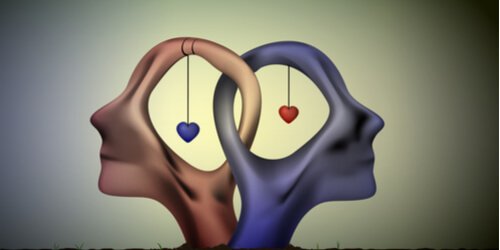Interpersonal Therapy: A New Way to View and Treat Depression

Depression, a word that defines a deep and incapacitating internal sadness, is the same that many don’t associate with the social context in which we live. The fact of the matter is that we’re social beings and context is as important for us as a vital organ. Following this train of thought, there are many new types of interventions and therapies that give importance to the relationship with the social environment. One of them is interpersonal therapy to treat depression.
In this article, we’ll explain what interpersonal therapy is and how it treats depression. We’ll also explore its history and what makes it so different from the other psychological interventions to treat this problem. Additionally, we’ll talk about its efficiency in adults, children, and teenagers.
There’s no worse feeling than feeling alone and depressed, even if we’re surrounded by people.

Characteristics of interpersonal therapy
Interpersonal therapy was originally developed by Gerald L. Klerman and his team as a therapy to help us not fall into depression. However, after analyzing the benefits, they concluded that this type of therapy made us stronger and more resistant to other problems.
The great power of interpersonal therapy lies in its ability to consider the patient’s most important emotional ties and interpersonal relationships. This therapy also accounts for the social context in which the patient lives.
IPT (interpersonal therapy) conceptualizes depression as a set of three components: symptomatology, social operation, and personality. It does this with the objective of influencing over the first two components. The therapeutic model focuses on four interpersonal problems:
- Interpersonal conflicts: they can be family, social, or work-related. These conflicts are inevitable since they originate in the counterposition of two or more points of view. They’re only treated in therapy if they cause great unrest. Interpersonal therapy is the best way to approach them.
- Role transitions: interpersonal disputes or role struggles emerge from conflicts. The person affected along with other significant people in their life expect different behaviors from their specific role. In other words, there’s a disagreement on behavioral expectations for a mother, father, or boss.
- Mourning: when the pain of losing a loved one is too intense or lasts more than it should, we could be experiencing pathological grief. IPT helps us with our emotions and to fill that void we feel in a healthy and positive way.
- Interpersonal deficits: this problem emerges when the person doesn’t have an adequate social support network. Consequently, feelings of loneliness and isolation arise. In this case, interpersonal therapy helps us find our own social space and improve our social skills, among other things.
These variables are extremely important in the context of depression because, when one of them come into play, people are at risk of falling into a “vital crisis”. These crises give way to a large number of psychological problems, one of the most common being depression. However, this type of intervention isn’t only effective for depression. For example, interpersonal therapy is an effective treatment for eating disorders.

Interpersonal therapy in childhood and adolescence
According to experts, interpersonal therapy is effective in the treatment of depression in adults and teenagers alike. This is important because it highlights the importance of having the ability to manage social relationships. Likewise, managing emotions that may arise from our relationships is equally important.
It’s important to remember that we live in a social environment that is constantly changing and we need to adapt to it. We must learn to confront our social problems and understand that our emotions are affected by social causes. This means we have to improve our ability to face our problems. Depression doesn’t have to be a personal or internal problem, it can be a contextual or relational problem.
This text is provided for informational purposes only and does not replace consultation with a professional. If in doubt, consult your specialist.








